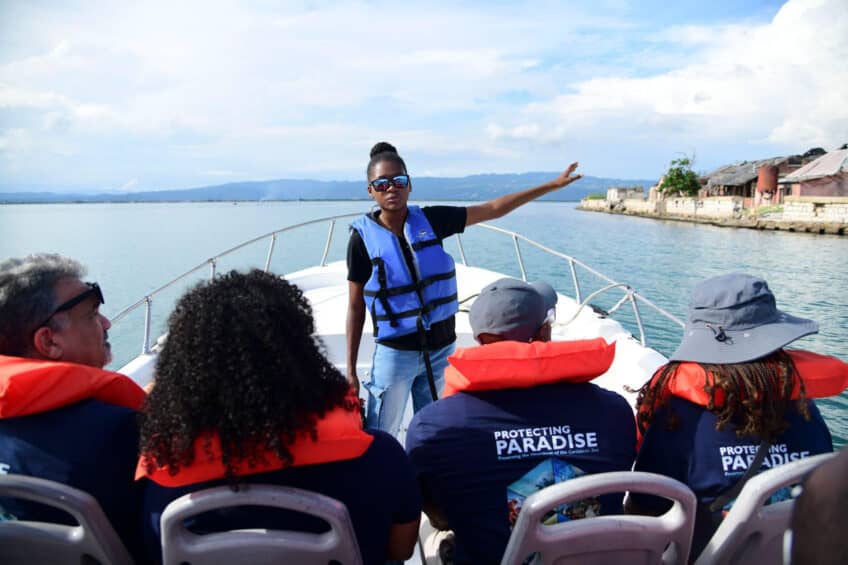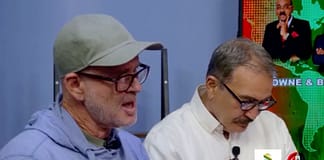
The U.S. Agency for International Development (USAID) launched the USAID Caribbean Sustainable Ecosystems Activity in Kingston, Jamaica on October 1. The USAID Caribbean Sustainable Ecosystems Activity is a regional program based in Santo Domingo, Dominican Republic, that aims to reduce threats to marine biodiversity by addressing three priority objectives: improved management of marine protected areas, improved solid waste management, and increased sustainability of fisheries.
In the Caribbean, marine and coastal ecosystems are critical for local livelihoods and economic development of the region, particularly for the tourism sector. In 2021, the travel and tourism sector contributed over $39 billion to the region’s GDP. The impacts of human economic activities like pollution, waste generation, and unsustainable fishing practices threaten the health and beauty of marine and coastal ecosystems. The USAID Caribbean Sustainable Ecosystems Activity aims to address these threats by working with the private sector to reduce the actions that are impacting these marine and coastal environments.
This five-year program, active until January 2029, is working with local communities and the private sector to identify priority areas and blue economy initiatives to be supported across 13 countries of implementation. These countries include Antigua and Barbuda, Barbados, Dominica, Dominican Republic, Grenada, Guyana, Haiti, Jamaica, Saint Lucia, Saint Vincent and the Grenadines, Suriname, and Saint Kitts and Nevis, and Trinidad and Tobago. Examples of types of initiatives to be supported include the designation of protection zones for marine mammals and sea turtles, investments in improved solid waste management systems, and working with fishers to help them meet large-scale tourism actor procurement requirements.
The USAID Caribbean Sustainable Ecosystems Activity is implemented by the Pan American Development Foundation, in collaboration with The Caribbean Climate Smart Accelerator, the Caribbean Regional Fisheries Mechanism, Caribbean Network of Fisherfolk Organisations, CollaborateUp, EarthCheck, and The University of the West Indies Center for Resource Management and Environmental Studies.
To further advance the project objectives, the program is fostering collaboration with key private sector actors, particularly among those in the tourism sector, such as Royal Caribbean Group, Sandals and Sandals Foundation, and Viva Resorts by Wyndham. Through collaboration with the program, these private sector actors demonstrate their commitment to enhancing their sustainability practices and promoting marine biodiversity in the Caribbean region. The event highlighted private sector partners and included a call to action for others interested in collaborating with the program.
“At USAID, we recognize that private enterprise is the single most powerful force in driving sustainable development, accelerating change, and promoting inclusive growth […]. The private sector’s willingness to partner with the USAID Caribbean Sustainable Ecosystems Activity demonstrates their commitment to sustainability and community-led development. Through this program, we also continue to strive toward USAID’s goals of locally led development. Local leadership is critical for increasing the equity, effectiveness, and sustainability of development programs. We aim to bring the voices and expertise of local communities, including representatives from marginalized and underrepresented groups, front and center through community-driven planning and locally led blue economy initiatives,” said USAID Jamaica Country Representative Dr. Jaidev Singh.
The two program launch events were planned around World Tourism Day on September 27, a special day highlighting the importance of tourism to the world economy, in recognition of the importance of the tourism industry in achieving marine biodiversity goals. The events featured a program overview, interactive presentations and panels from public and private sector partners. Both events were followed by site visits to marine areas during which participants learned about critical threats to marine biodiversity and actions taken to reduce these threats.
Advertise with the mоѕt vіѕіtеd nеwѕ ѕіtе іn Antigua!
We offer fully customizable and flexible digital marketing packages.
Contact us at [email protected]
















